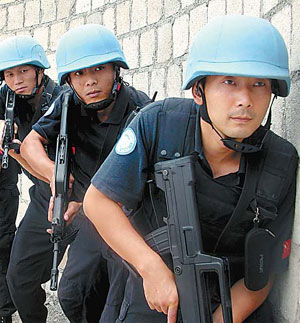Chinese police force second largest among UN peace missions
By Zhu Zhe (China Daily)Updated: 2007-07-24 06:37
|
Chinese anti-riot troops search for millants in Port-au-Prince, capital city of Haiti, on June 10, 2006. Chen Jin |
About 190 Chinese police officers are serving under the UN flag in Kosovo, Liberia, Timor-Leste, Sudan and Haiti to maintain law and order, and help train local police, placing them only behind the United States with their 288-strong contingent.
Guo Baoshan, deputy director-general of the international cooperation department of the Ministry of Public Security, says in an interview that the Chinese government has always extended "active support" to UN peacekeeping operations.
Ministry figures show that 1,028 Chinese police peacekeepers have served the UN since China dispatched the first team in 2000. "All provinces, municipalities and autonomous regions across China have been contributors to UN peacekeeping operations," Guo says.
The ministry also reveals that the Chinese peacekeepers in Haiti, who have successfully completed their mission of safeguarding 60 schools during Haiti's entrance examination for secondary school and college, would return in December.
They will be replaced by another team of 125, most of whom are border policemen from Southwest China's Yunnan Province.
Guo notes that unlike the military officers who mainly enforce ceasefires and defuse tense situations, UN peacekeeping police shoulder the responsibility of reconstructing the local legal system and assist in law enforcement, as well as help protect civilian rights and assist humanitarian relief efforts.
"Once dispatched, Chinese peacekeepers work as UN employees," he says. "They don't receive any order from the Chinese government while on duty."
The director says the ballooning demand from the UN is testing China's peacekeeping capacity. Sometimes, China has to turn down a UN request for police peacekeepers because of the shortage of hands, he says.
To establish a reserve from which current and future UN police peacekeeping vacancies will be filled, the ministry has held seven national examinations, the latest being the one held last March.
Among the eligibility requirements are that candidates should be at least 25 years old and have worked as police officers for more than five years; they should be able to communicate in English and be familiar with UN rules and regulations; and they should be both physically and mentally fit.
All candidates are tested on their language skills, physical strength and professional skills, including shooting and driving.
Guo says only a small number passed the highly competitive exam. "We set high standards. For example, only 50 to 60 out of the total 500 candidates passed in 2004."
Training is also given high priority. Those who clear the exam undergo a three-month training at the Chinese People's Armed Police Forces Academy, in North China's Hebei Province, where they take classes in language, computers, shooting, driving, geography, mine sweeping, international politics, human rights and diplomatic protocol.
They then have to sit through a final exam administered by a special team from the UN peacekeeping department before being put on the reserve roster. Guo says about 70 to 80 percent of the trained Chinese candidates pass the final exam.
The Chinese government covers all expenses for the exams and training, but the UN gives allowances to Chinese peacekeepers while on duty. These vary from $100 to $180 per day per person, according to the circumstances and according to the ministry.
Terms for Chinese peacekeepers also run from eight months to one year. Once they return, they go back to their former departments and are more likely to be promoted because of their experience overseas.
At the end of the interview, Guo stresses that China is proud of the fact that "no Chinese peacekeeper has ever violated UN discipline."
(China Daily 07/24/2007 page21)
|
||
|
||
|
|
